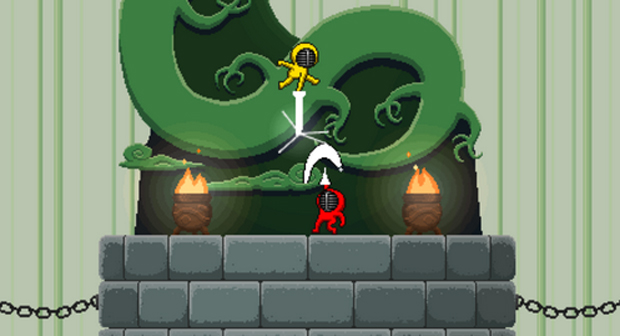Thrust and rush
Last weekend, I dropped in on IndieCade East to have a look at some of the new games being shown off. Foiled is one such game and I can’t get it out of my mind. Designed by first-time developer Gabe Cuzzillo, it puts two players in a single-screen arena, each controlling a fencer, with the aim of stealing the other’s soul.
Like many multiplayer arena combat games, Foiled is both physically and psychologically demanding. Moments of quick action punctuate contemplative strategy. Good offense provides more offensive opportunities, while good defense provides the chance to stop a swelling tide cold. Foiled exploits both to force players into uncomfortable decisions with aplomb.
Helping to keep the game streamlined and fast are the stripped down fencing mechanics. Foils stick out directly in front of the characters at almost all times, making thrust and parry techniques passive activity on the horizontal plane. If the tip of your sword hits the opponent’s body, it kills them. If it hits their sword, it parries. That’s the simple bit.
When things get vertical is when they get interesting. Fencers can jump and use their ever-pointing foil to perform wall jumps off of environmental objects, then come crashing down on their opponent with a dive. This can be dodged or parried with the game’s only other command, a quick upward slash which requires precise timing but can be used both defensively and offensively when mastered. And, of course, both maneuvers temporarily open a combatant up to taking a sword in the side by sacrificing that constant, passive defense in the forward-facing direction.
Just killing your opponent isn’t enough to win. Once someone has died, their soul is released and the killer now has ten seconds to carry it into a scoring area in one of the arena’s upper corners before it disintegrates. The slain player then respawns close to the scoring area, giving them an opportunity to defend from a positional advantage while creating an obstacle for the player trying to score. Failing to score before a soul dies means having to secure another soul, placing pressure on the offensive player to either stay on the offensive or lose their advantage, while the defending player need only keep their opponent at bay long enough to level the playing field again.
This creates tension of a most wonderful sort. While you can draw clear comparisons to recently released Nidhogg, as they do share several common mechanics and both package them in the style of a fencing duel, Foiled can be much more heartbreaking to lose as victory never seems far out of reach. A truly great player could chain together one kill after another and score the three points necessary to be a round’s victor in a very short fashion, but the ease with which a player can defend — owing to the passive manner in which all movement both attacks and defends in the direction the player faces — makes even a novice threatening to overly aggressive strategy.
You don’t just have to take my word for it. Grab a friend (and a couple of controllers; keyboard support exists but is not recommended), go download the game for free from the official Foiled site and get to stabbing. As a first attempt at game development, Foiled suggests that Cuzzillo is a designer worth watching.








